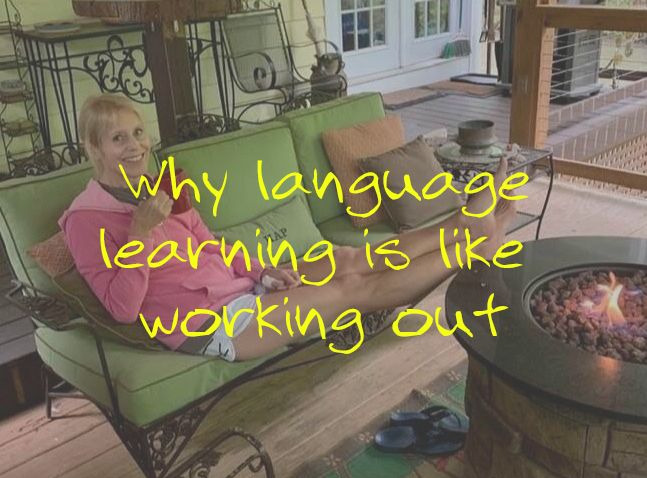
As someone who’s worked out almost every day for the past 20 years, I think a lot about exercise. And it seems to me that the advice I give to language learners is a lot like that I give to people who are trying to get in better physical shape. (Yes, that’s me in the photo above, after a workout while on vacation … I literally never take a break from exercise because “if you don’t use it, you lose it,” and that goes for fluency as well!) So what do I tell people? First …
You need to find something to motivate you
When people decide to lead a fitter lifestyle, they usually have something that inspires them to begin … whether it’s a warning from their doctor, the desire to keep up with their kids, or simply a good long look in the mirror. Language learners should find something that motivates them as well. Maybe it’s a TOEFL score that will be your ticket to a prestigious university or a better job. Maybe it’s an opportunity to live in an English-speaking country. Maybe it’s just a deep-seated desire to speak English better. Whatever it is, keep this motivation in mind because …
You need to accept that this is a long-term endeavor
You don’t become fit overnight, and you won’t learn better English overnight either. Furthermore, just like exercising, you need to keep at it to stay at whatever level you’ve achieved. There are no magic potions or shortcuts to attaining fitness or fluency. You have to make up your mind to stick with it over the long haul. In this case …
You probably need someone to help you
When you’re developing a fitness routine, you may choose to use a personal trainer or enroll in exercise classes. When you’re developing fluency, you may want to find a teacher or an English class. But if these don’t suit your personality or your circumstances, think outside the box. When I started exercising, I became very active on an online forum for people who work out at home. You may be able to find an online community of English learners, or just one learning partner. The goal here is to find an individual or a community who can help answer questions, give you advice, sympathize with your struggles, and provide motivation and support. Language learning is more fun when you make connections, which brings me to another piece of advice …
You should pick language learning activities you enjoy and that suit your learning style
I would never have continued working out for so long if I weren’t doing workouts I enjoyed. When I started 20 years ago, I was homeschooling my three children and couldn’t get to a gym regularly. Well, home workouts turned out to be perfect for me, and I still look forward to my morning exercise routine every single day. If you don’t enjoy what you’re doing, it’s going to be hard to keep doing it for any length of time. There are soooo many options for learning English, even for (relatively) boring stuff like grammar. Sure, you can get a grammar textbook, but you can also study with a teacher, or go to my favorite grammar website, or listen to YouTube videos or other online materials. And when it comes to reading and listening, the sky’s the limit! However, while you definitely need to choose activities you enjoy, you also need to realize that …
You have to push yourself to make progress
Language learning, like exercising, isn’t all fun and games. I absolutely love my workouts, but they’re hard work! At the end of a cardio session, I’m usually dripping sweat. When it comes to weight lifting, that last repetition is a killer! Same with language learning. Stephen Krashen, one of the biggest names in second language acquisition, theorizes that learners acquire language through input + 1. Input is the stuff coming in … whether it’s an episode of your favorite English series, a podcast, or a news article. +1 means that it’s just a little bit more advanced than your current level. It’s the same principle with fitness. If I always do bicep curls with a 10-pound dumbbell, when it no longer challenges me, my muscles won’t get any stronger. If I switch to 12-pound dumbbells, I’ll continue making progress. Same thing with language learning. You always need to be pushing yourself a little bit … not too hard or you might get discouraged, not so challenging that it’s no longer fun, but hard enough so that you keep getting better. You can speak a bit more confidently, you can understand more of what you hear, you can read more challenging material, you can write more quickly, with fewer mistakes. With a bit of effort, made consistently, you’ll be amazed at what you can achieve!






